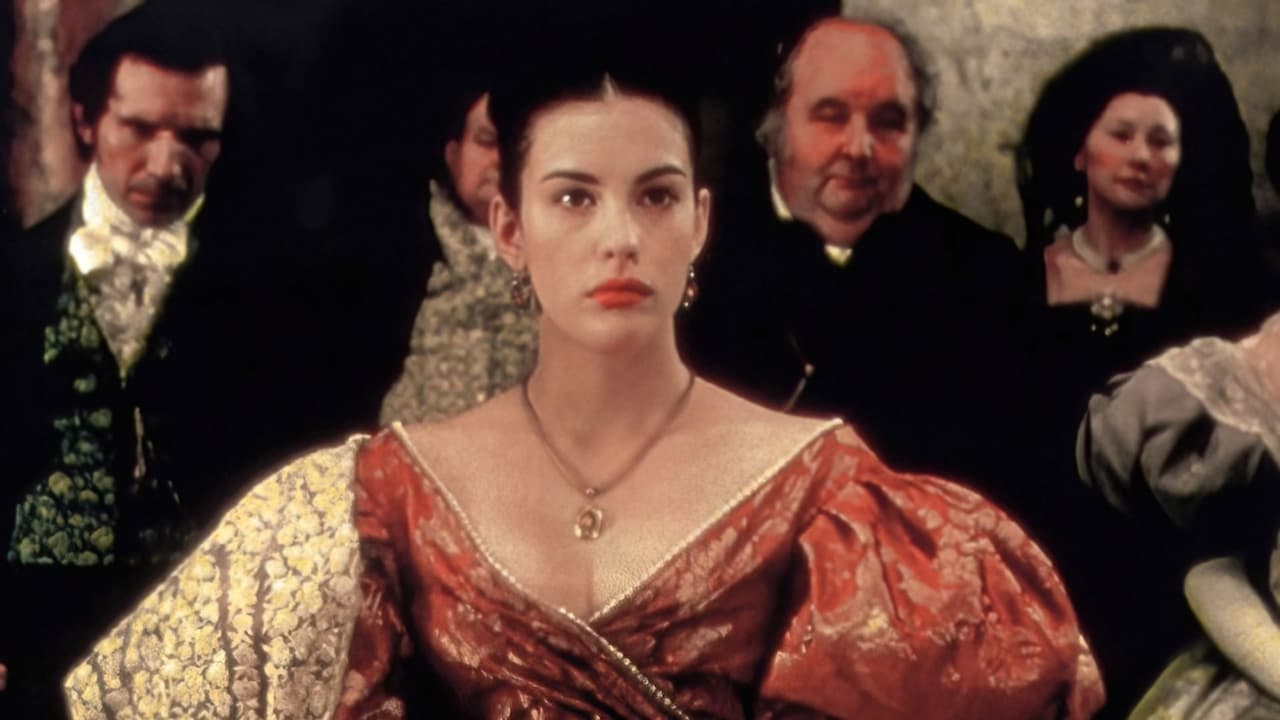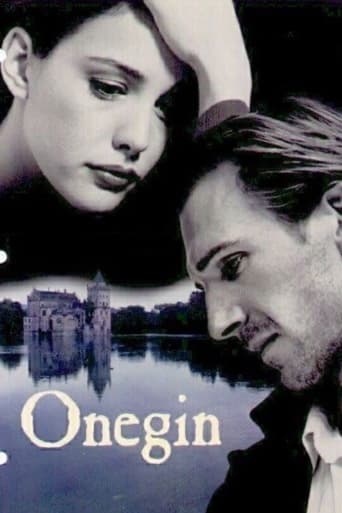

The 1999 cinematic production Onegin left this viewer as moved and distraught as the 'superfluous man.' Although certain social observances, such as 'the duel,' or marriage as an intractable institution, are without equivalents in our society, I believe Onegin's dilemma is identifiable. He is molded by the times and St. Petersburg's decadent society of nobles, but he is also alienated by it. He stands in observation of its faults and of his own. The story finds the character uncompliant but not rebellious. He is without outlet, or his own definition of nobility.The figure of Olga's French tutor assails Onegin for acknowledgement, but Onegin, in his clever way, dispatches this symbol of the Russian Gallomania. The Onegin character displays the uncanny ability to see through society's contrivances—even if he arrives at no definite conclusions. At the same dinner conversation he submits his sentiment that no man should own another in active defiance of the nobility's hold over the serfs. This audacious statement brings him closer to his would-be love, Tatayana, who looks on in admiration.She bears her heart to him, an offer he refuses. His explanation that marriage holds only disappointment seems to highlight his particular reaction to social norms. While he enjoys the freedom of nobility as well as explicit decadence, he broods on the critique of a society engaged in its own disgrace. His response to cynical nobility is alienation. His answer to the squalid institution of marriage is debauchery. And for these shortcomings he, himself, seems doubly jaded. He faces Tatayana as an apologist, and he seems embarrassed. After all, her offer of marriage is an opportunity to engender a true nobility of mind and spirit. Pleasure-seeking, and intellectualization are a vain reaction to what appears to be a cold and aggressive world. Tatayana exposes him in this respect. On the other hand, he has earned her love through his own keeping and defiance achieved through isolation. Onegin invites destruction on both himself and Tatayana in pursuit of this love. Viewers find him beseeching her in a room of marble, her royal husband asleep upstairs. Finally, she admits to him her continued love, which has not been destroyed, even by his neglect and the harshness of society. This admission is both a victory and a wretched fate.It is preferable to the fate he invites. His gesture promises to ruin Tatayana's honor as well as his own. For Onegin, the moment is a test of the conviction of love. He, therefore, marches directly to Tatayana where she sits reading in her husband's mansion to profess his love and defy institution at all cost. She turns him away forever to avoid total ruin.This fate is the fate of the 'superfluous man,' of the Russian who grapples with questions of self and places his will at odds with the forces of nature and society. The principle pathos of the film is the search for answers to those "accursed questions" which elude Onegin in the city and through the country landscape. Viewers peer through his windswept heart ultimately to dicover Pushkin's heroine, Tatyana, who like those answers, shall remain untouchable in the house of Nobility.
... View Moreactually a comedy.the original title was 'a day late and a dollar short', after a Hollywood bigwig was rummaging thru the studio archives and stumbled on an old 3 stooges script and decided the modern treatment would be to come up with another in a string of feinnes pieces passed off as a costume drama.the costumes were supposed to be clown costumes but since there was a glut of personnel and makeup artists doing stuff like 'sense and sensibility' it was decided to snazzy it up a bit.so they came up with this square peg in a round hole approach and once again, shopped around for who would fit the bill re 'when yer hot yer hot, when yer not yer not' and the names feinnes and liv deary came up.was this before or after those dreadful LOTR sequels of sequels where she hardly says anything? was this in her 'on the way up' or 'on the way down' phase of her film career? she was fairly good in 'inventing the abbots' but that's because she was at her peter principle level of highest competence. not so this vehicle. more like a vehicle hit by a train called reality of what you get with mediocre but much ballyhooed actors. aka 'hype hype hype' some sort of pep rally cry suitable for a high school football team. not suitable for a story that's been around this long.at least we don't have to hold our breath waiting for yet another version in this century; anyone else who may have contemplated it in another life was surely convinced the odds were not good since ms tyler and mr feinnes showed just how bad the pooch can be screwed by not getting suitable actors.you think I'm kidding about the day late and a dollar short theme? I counted at least 3 of them without trying: the dinner, the duel and the 'bitter sweet' (emphasis on bitter like the taste of stale beer) closing scene. I am so glad DVD player manufacturers perfected that feature you can speed up the playback and still hear the voice track at the original frequency, it just comes out in a rapid fire clipped manner. that cuts down the boredom until those blessed end credits envelope this symbol of the downfall of a frivolous life.I'm talking about the lead actors careers, not the characters in the story.
... View MoreOnly people with a British/American mind who never read Onegin in the original version can enjoy this. The movie is made in a British way, things that are being displayed in the film are more suitable for England, not Russia. Not to talk about the awful Russian music. The music is good and pretty well known in Russia, but... this was composed in the middle of the 20th century (some of it was used before as soundtracks to cult Russian films) definitely unsuitable for the time Onegin lived in.Nevertheless, most of the world would think it's good movie, and it is. But the Russians would find it quite laughable and wrong. Hence this movie isn't REALLY good.Fiennes and Tyler are casted well.
... View MoreSeveral members of the Fiennes family collaborate to produce 'Onegin', a story of unrequited love and based on Pushkin's epic poem. The film looks wonderful, there's an icy beauty in the way that scenes are framed (which gives the movie its own distinct aesthetic, albeit at a price of conveying a certain cliche of Russia), and the overall tone is excellently judged. Slightly strangely, the film was shot in English (and English English at that), so that occasionally Liv Tyler sounds wrong (to this English ear) is spite of the fact that she is supposed to be speaking Russian! But in general the performances are good (and it's fun to see Martin Donovan in an unlikely historical role).However, I can't help but feel that if you were to set the same story on a modern council estate, no-one would dare stretch so little plot over an entire film. The set-pieces are terrific, the images are lovely, but the truth is that nothing really happens. Which is not to say I dislike this particular film, but why should a costume drama be more languid per se than an L.A.-set thriller? This comment cuts both ways, of course: it's just a (pointless) appeal for directors to make films at the pace demanded by their material (as opposed to their expected audiences). In fact, 'Onegin' itself is better able than most films of its kind to justify its tendency to luxuriate in its setting because of the intensity of its imagery. A solemn, but good, film.
... View More